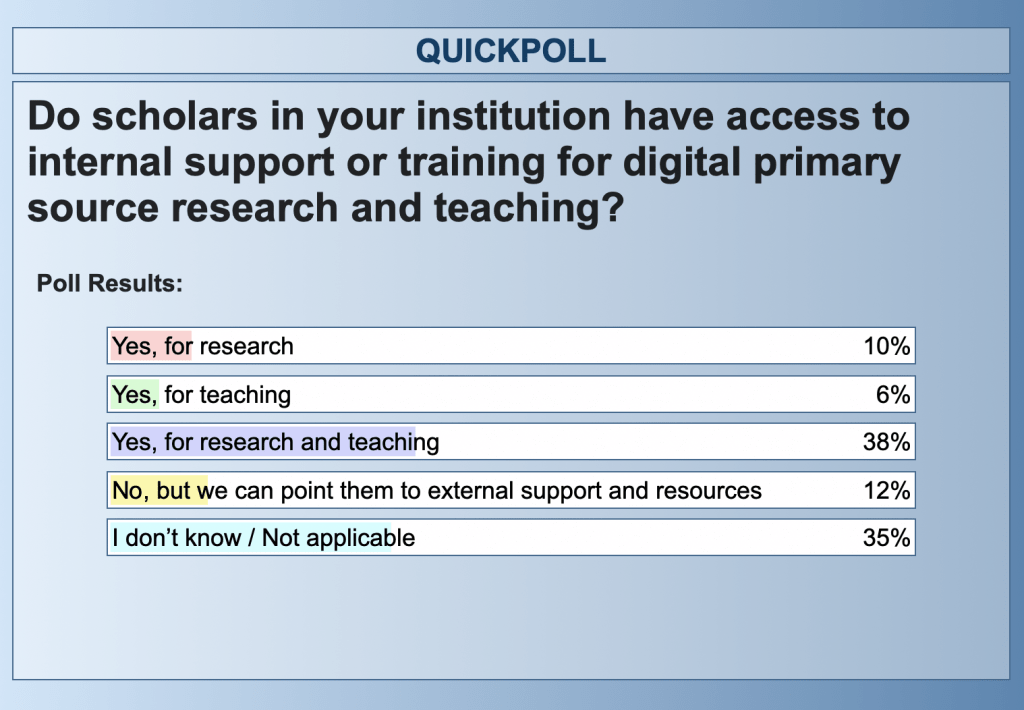UKSG webinar – The importance and use of digital primary sources in teaching and research
#UKSGWebinar
poll: do scholars in your institution have access to internal support or training for digital primary source research and teaching

 Peter Foster with Wiley, facilitator
Peter Foster with Wiley, facilitator
Hugh Murphy, Head of Collections and Content, Maynooth Univesity Library, Ireland
@hughtweet
what is a primary source.
Functionality (ability to access)
U collections as part of a larger U ecosystem. Conceptional change for Special Collections
Teaching Learning and Research: “digitally-enabled and technology-supported learning” – strategic planning
Research: digital humanties dhlag.yale.edu/project/vogue
Open Access (publishers ARE business). For a small country (university), how much will a publisher pay attention? Will a standard pay attention to OCR a 16th century document.
Sarah Evans, Research and Collections Engagement Manager, Royal Geographical Society with IBG
https://www.rgs.org/about/our-collections/
Collaborative Doctoral Program
WDA Research Fellowships
Kathryin Simpson, Lecturer in Information Studies, U of Glasgow
Hidden Voices: Using the digital archive to critically negotiate histories
digital environment is not just a PDF, but a whole new environment.
record open and accessible by these docs from Africa
Q&A: does the access to primary sources demand different approach to critical thinking.
Why online HE should be about learning, not teaching
https://www.universityworldnews.com/post.php?story=20210126142422302
The gate is now wide open
Teachers used to be the gatekeepers to information, to knowledge. The successive inventions of writing and reading, print, the library, and then the World Wide Web, mean that we teachers are no longer the gatekeepers.
Schools, universities and teachers to some extent remain the gatekeepers to knowledge, the definers of what comprises valid knowledge. We do this, of course, through holding the ultimate educational power – the power to assess.
But it is not clear how long we teachers will, or should, hold this power. Increasingly, students, and employers, nations, cultures, many groups in our societies, rightly want a say in defining what is valid knowledge, a valid curriculum.
Knowledge isn’t enough
Each year, vast amounts of new knowledge are produced. Also, each year, vast amounts of current knowledge become wrong, or redundant, or both. Knowledge dies. In some subjects, a significant proportion of what was taught in the first year will have died by the time the students who learned it graduate. So, what is education for?
Machines are doing more and more of the work
The bad news is, we are getting squeezed out of work. The good news is, we are getting squeezed up, into ever more interesting work. We will be able to stay ahead for a long time; because there are always still more difficult and important and exciting things for us to do, increasingly with the support of our increasingly capable machines.
Employers want graduates to be job-ready. They also want graduates to be fluent in the five Cs: Creativity, Communication, Collaboration and Criticality as well as Competence. Not all university education currently develops the first four Cs. Very little university education currently gives high priority to their development. Rarely are they formally assessed.
Changing outcomes, changing pedagogies
The architecture of a university expresses its views about pedagogy. This remains true with the great leap online. The old pedagogic architecture – of teaching as (mainly) telling, of learning as (mainly) listening and reading, of access in and through the library to specified stored knowledge, and of assessment as (mainly) recalling, repeating back what has been learned, perhaps with some application or interpretation – has for the most part been recreated in digital form, with varying degrees of success
+++++++++++
more on online education in this IMS blog
https://blog.stcloudstate.edu/ims?s=online+education
A look at trends in college consolidation since 2016
https://www.highereddive.com/news/how-many-colleges-and-universities-have-closed-since-2016/539379/
Our goal was not to create a death watch but rather to give our readers a tool to show the scope of that activity and any patterns within it. To make those trends easier to detect, we updated our tracker with a map showing closings and significant consolidations by state.
https://www.universityworldnews.com/post.php?story=20210129110449887
Upskilling for Shared Prosperity predicts that upskilling and reskilling could propel the transition to an economy where human labour is increasingly complemented and augmented – rather than replaced – by new technology, thus improving the overall quality of jobs.
Inertia in educational systems
The new Davos report points out that education systems – in particular secondary and tertiary education – must act and embrace this to play a central role in a comprehensive upskilling agenda.
Several higher education areas urgently need addressing:
• Curricula:
• Technology:
• Education providers:
• Qualifications, experiences and recognition:
• Connectivity:
• Credentialing:
Role of universities
“New arrangements – shorter, modular, part-time, with mixtures of in-person teaching and asynchronous self-directed learning – have to be developed. And to do that in a high-quality manner requires an enormous investment.”
+++++++++++
more on 4th industrial revolution in this IMS blog
https://blog.stcloudstate.edu/ims?s=industrial+revolution
 Peter Foster with Wiley, facilitator
Peter Foster with Wiley, facilitator